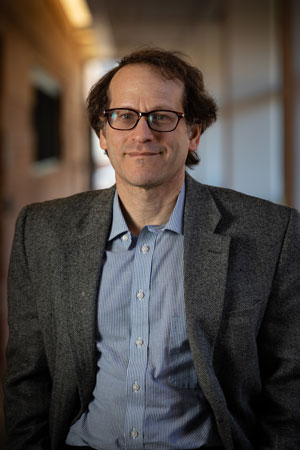
David Greenstein steps into the role of interim dean August 10. He brings with him a wealth of leadership experience including four years as associate dean for research and decades running a highly regarded research program. Greenstein shares his thoughts on leadership, advancing diversity, equity, inclusion, and justice, what inspires him, and more.
Can you talk a bit about your approach to leadership?
My approach as an administrator is informed by my experience as a scientist. I find that giving my team independence and space for creativity allows the best ideas to emerge. Helping people do their best work by creating the conditions for that—removing barriers, recognizing good work, etc. — is key. I empower my colleagues to work independently, contribute to decision-making, and be fearless about taking risks and offering criticism. It is important to value the people that make you less comfortable — those folks that challenge your ideas or bring new approaches or ways of thinking to the fore. Listening is an underrated skill and is critically important for understanding the needs of students, staff, and faculty. I also think of myself as a“player–coach.” I still do experiments myself (e.g., genetics and genome editing) to this day!
What do you see as important priorities for the college during this transition?
The last few years have been exceedingly challenging for our students, staff, and faculty. Many continue to grapple with uncertainty and disruption. That said, I am amazed at the resilience and perseverance exhibited under very difficult circumstances, especially since it often felt like walking through molasses. It took more effort to get ahead. There is no doubt that many educational, professional, and research careers were negatively affected and I think we have to understand the scale of it and come up with strategies to help make it easier for folks to do their jobs.
Given what we’ve all experienced, my goals going forward are to build community and promote a sense of belonging. I’d also like to continue to create opportunities for connecting across departments and disciplines within the college. There is so much exciting science of broad interest going on in the college, which provides an opportunity for promoting engagement and interactions.
What are some ways you plan to support diversity, equity, inclusion, and justice work in the college?
Scientists, students, and educators with diverse backgrounds and identities are integral to a vibrant, creative, and productive collegiate environment. Making our research and learning spaces kind, welcoming, and inclusive is of critical importance, which is why ensuring that people are empowered to do this work and truly make it a part of everything they do is key. With that in mind, we will continue the microgrants program, which supports grassroots diversity, equity, inclusion, and justice efforts across the college. We are also developing a plan to implement recommendations around recruitment and retention, inclusive teaching, and incentives and recognition, and will boost our communications around DEIJ initiatives and opportunities in the coming year.
In addition, the college will continue to expand access to paid research opportunities for our undergraduate students through the Dean’s Undergraduate Research Opportunities Program. Part of being at a Research 1 institution is that undergraduates are taught by professors who contribute to their discipline through their creative and influential research. I would like every undergraduate who wants to participate in research to have that opportunity. By providing competitive wages for these positions, we ensure that all students are able to engage in this important professional development experience.
So much is happening at every level from student groups to graduate programs. Our departments are doing a nice job bringing folks together to advance this work as well. To give just a few examples, the Department of Biology Teaching and Learning — a driver of evidence-based practices that support inclusion in undergraduate STEM curricula — was recognized by the Office of Equity and Diversity with its unit award this spring for its efforts. The Genetic Counseling Program has also done important work in the DEIJ arena and its efforts to improve reproductive health services. While much work remains, I see hopeful signs all around.
What inspires you most in your work as an educator and administrator?
I’m still driven by the thrill of discovering new things. I find it particularly rewarding to help others have the same opportunity. I love teaching and mentoring.
What are you most looking forward to in the coming year as you take on this new role?
I’m looking forward to continuing to learn new and different things every day. Thankfully, I have terrific colleagues on my leadership team in the Dean’s Office, and I’m excited about learning from them.